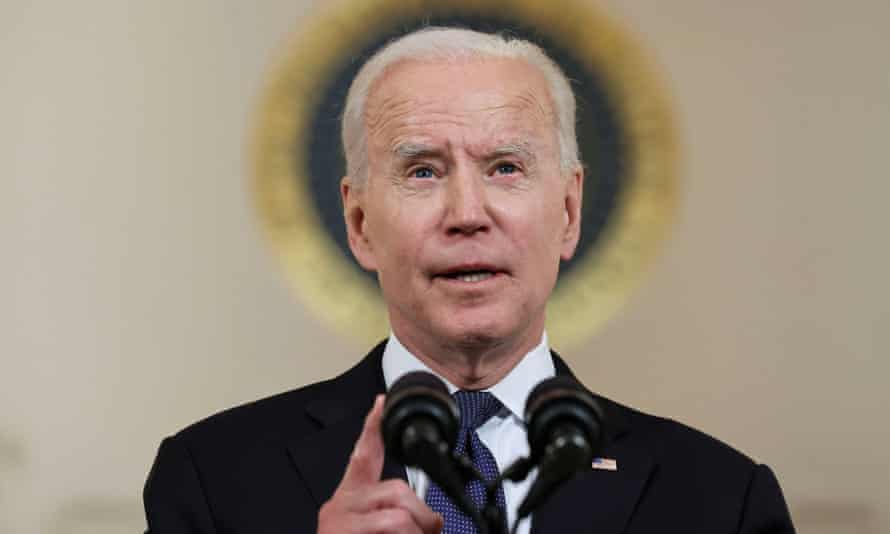ENTERTAIN
Biden’s Silence on Abortion Rights at a Key Moment Worries Liberals
Published
5 years agoon
By
BRJ Media
By Lisa Lerer
Recommended by BRJ Media
State legislatures have introduced more than 500 restrictions on abortion over the past four months. The Supreme Court plans to take up a case that could weaken or even overturn the constitutional right to abortion enshrined nearly a half-century ago in Roe v. Wade.
And as reproductive rights advocates sound alarms about what they see as an existential threat to abortion rights, many worry that the leader they helped elect is not meeting the moment.
Despite the urgency felt by much of his party, President Joe Biden has said little about abortion publicly while in office. In fact, he hasn’t said the word itself — an avoidance so noticeable that one women’s health group has created a website tracking his reluctance, DidBidenSayAbortionYet.org.
Many activists fear that Biden’s personal discomfort with the issue is keeping him from leading the Democratic Party into a more offensive position on abortion rights, both through more aggressive policymaking and leveraging the agenda-setting power of the presidency.
“What we really need is for President Biden to be a bold and transformational leader on abortion right now, but we haven’t seen that yet,” said Gretchen Borchelt, vice president for reproductive rights and health at the National Women’s Law Center. “It’s a different world from when he was vice president, and so far we haven’t felt that recognition of urgency from this administration.”
Jen Psaki, the White House press secretary, has been just as circumspect in her public appearances. When asked about topics like new state laws restricting abortion and the looming court case, she has relied on euphemisms like “women’s fundamental rights” and “the right to choose.” A White House statement in January on the 48th anniversary of the Roe v. Wade decision promised to defend “reproductive health.”
After Biden signed executive orders expanding abortion access and overturning restrictions on the use of taxpayer dollars for clinics that refer or counsel patients to terminate pregnancies, he took a victory lap for protecting “women’s health access” and returning to the policies that existed before former President Donald Trump took office.
“If you’re unable to say the word, you’re also going to have trouble making sure that the people who are most impacted get the care and the protections that we need,” said Renee Bracey Sherman, an abortion rights advocate who started the website monitoring Biden’s reticence. “To me that’s not a champion. That is not someone who is really even trying to show up for people who need abortions.”
Biden’s cautiousness on an issue central to his political base comes as he confronts the realities of leading a Democratic Party that shifted sharply to the left during the Trump administration. While Biden has moved left himself on many issues including abortion, liberals are finding their ambitions curtailed on immigration, criminal justice, gun control and other priorities by their razor-thin control of the Senate and a president whom they are pushing to take a more aggressive approach.
The disagreement within the party over priorities is particularly acute on abortion rights, a core part of Democrats’ pitch to the suburban and Black women who helped lift Biden into office. Planned Parenthood and other reproductive rights organizations poured tens of millions of dollars into Biden’s campaign, a recognition of the damage the Trump administration and Republican control of Congress caused to their movement.
Still, abortion rights are particularly challenging personal terrain for Biden, an observant Catholic who underwent a decades-long conversion to the cause. Some conservative American bishops have called for Biden, the country’s second Catholic president, to be denied communion because of his support for abortion rights, a move the Vatican warned against this month.
A White House aide Wednesday declined to comment on the specific criticisms from reproductive rights advocates but said the administration remained committed to protecting abortion rights.
“The president and the vice president are devoted to ensuring that every American has access to health care, including reproductive health care, regardless of their income, ZIP code, race, health insurance status or immigration status,” Psaki said at a briefing last week when asked what actions the administration might take if the Supreme Court ruled to undermine Roe.
Congressional Democrats pushing legislation on abortion say they are largely satisfied with the administration’s stance.
“They’re juggling quite a few policies, but their agenda is an agenda that values reproductive rights for women,” said Rep. Barbara Lee of California, a Democrat who has introduced several bills to roll back abortion restrictions. “I’m confident that we have a partner in the White House.”
No matter what approach Biden takes to expanding abortion rights, his administration will be starting from behind. Access to abortion is more vulnerable than it has been since the constitutional right was won in Roe, in part because of the work of social conservatives who spent years methodically rallying the millions who oppose abortion rights from statehouses to Washington.
Liberals lost the Supreme Court for a generation when Justice Amy Coney Barrett was confirmed last fall, expanding a conservative majority. If the court moves to overturn Roe, abortion would be likely to quickly become illegal in 22 states. Even if the law is upheld in some form, this year is already on track to be the most damaging state legislative session to abortion rights in a decade, according to a report by the Guttmacher Institute, a research group that supports abortion rights.
After decades in which conventional political wisdom dictated that abortion energized the right, many Democratic strategists and candidates now see the issue as a powerful way to mobilize their voters, particularly suburban women. Nationwide, a majority of Americans support legal abortion access in some or all cases.
“From the presidential race to House races, this is an extremely motivating factor,” said Meredith Kelly, a Democratic strategist who worked for Sen. Kirsten Gillibrand’s presidential campaign and for House Democrats’ campaign arm during their takeover of the chamber in 2018.
Biden entered the Senate in 1973 as a 30-year-old, just weeks before the Roe v. Wade decision. He soon concluded that the Supreme Court had gone “too far” on abortion rights, and years later voted for a constitutional amendment that would have allowed states to overturn Roe. He has cast his evolution as a matter of wrestling with the teachings of his faith. But his shifting views over the years also reflect a political calculation about the changing mores of his party.
Under pressure from activists and allies early in the 2020 Democratic primary race, Biden reversed his decades-long support for the Hyde Amendment, a measure that prohibits federal funding for most abortions, and that supporters of abortion rights say all but bans the procedure for poor women and women of color who rely on Medicaid for their health care. Campaign aides who urged Biden to shift his stance have said his initial reluctance was tied to his faith.
Yet as a presidential candidate, Biden was far less vocal than many of his rivals in the primary, including Vice President Kamala Harris, who once compared an Alabama law effectively banning abortion to “a scene from ‘The Handmaid’s Tale.’”
“If one were to look at him as a Catholic and his attendance at Mass and the way he looks at life and death and everything else, culturally he’s like 1,000% Catholic,” said Jo Renee Formicola, a professor of political science at Seton Hall University who studies the relationship between the Catholic Church and American lawmakers. “He’s very, very Catholic, but when it comes to being political, he’s much more pragmatic than Catholic.”
In office, Biden has reversed several Trump administration policies, including rolling back restrictions on abortion pills, removing a ban on federally funded medical research that uses fetal tissue from abortions, and reversing limits on funding for U.S. and international groups that provide abortion services or referrals.
Some abortion advocates say those early moves fall short. His joint address to Congress did not mention the threat to abortion rights, referring only in passing to “protecting women’s health.” Harris, once fairly outspoken on the issue, has made no notable remarks on it since taking office.
“The level of the crisis calls for a stronger level of leadership,” said Kelley Robinson, the executive director of the Planned Parenthood Action Fund. “We’re looking for them to be explicit champions for sexual and reproductive health care and to use that bully pulpit to make sure that’s a priority that’s expressed from the highest office in the land.”
Many advocates are looking to the president’s fiscal 2022 budget, set to be released Friday, as a crucial marker of the administration’s position. Reproductive rights organizations are pushing Biden to make good on his promise to eliminate the Hyde Amendment and other restrictions on federal money.
His administration has also called on Congress to codify abortion rights, which would guarantee reproductive rights nationwide even if the Supreme Court overturned Roe. But it has not proposed specific legislation or unveiled any strategy for pushing such a bill through Congress.
Many in the reproductive rights community believe Biden must expand his agenda, adopting ideas from the Democratic primary like a federal preclearance requirement for state abortion laws; banning targeted regulations of abortion providers that make it harder for clinics to remain open; making the drugs misoprostol and mifepristone, which induce abortions, available around the country; and nominating only judges who support abortion rights, an explicit pledge Democrats have long avoided.
“Codifying Roe is basically meaningless in states that have legislated it out of reach. If that’s your standard-bearer, then we’re having the wrong conversation,” said Destiny Lopez, a co-president of All* Above All, an abortion rights group. “There is an opportunity here to put out a longer-term, broader vision that’s based on the reality of abortion access today.”
Of the Biden administration, she added: “They could start by actually saying the word.”
This article originally appeared in The New York Times.
© 2021 The New York Times Company
You may like
-
How would you like to enjoy the holiday with school kids at home, and how do you ensure the selection of furnitures of proper posture and ergonomic?
-


Recommendation: Here One Moment
-


Book View: The Rise of the Dragon
-


Recommendation: A Voyage Around the Queen
-


Precipice: A World On The Brink Of War. An Affair On The Edge Of Scandal
-


Ex-OpenAI researcher claims Sam Altman doesn’t support AI regulation










